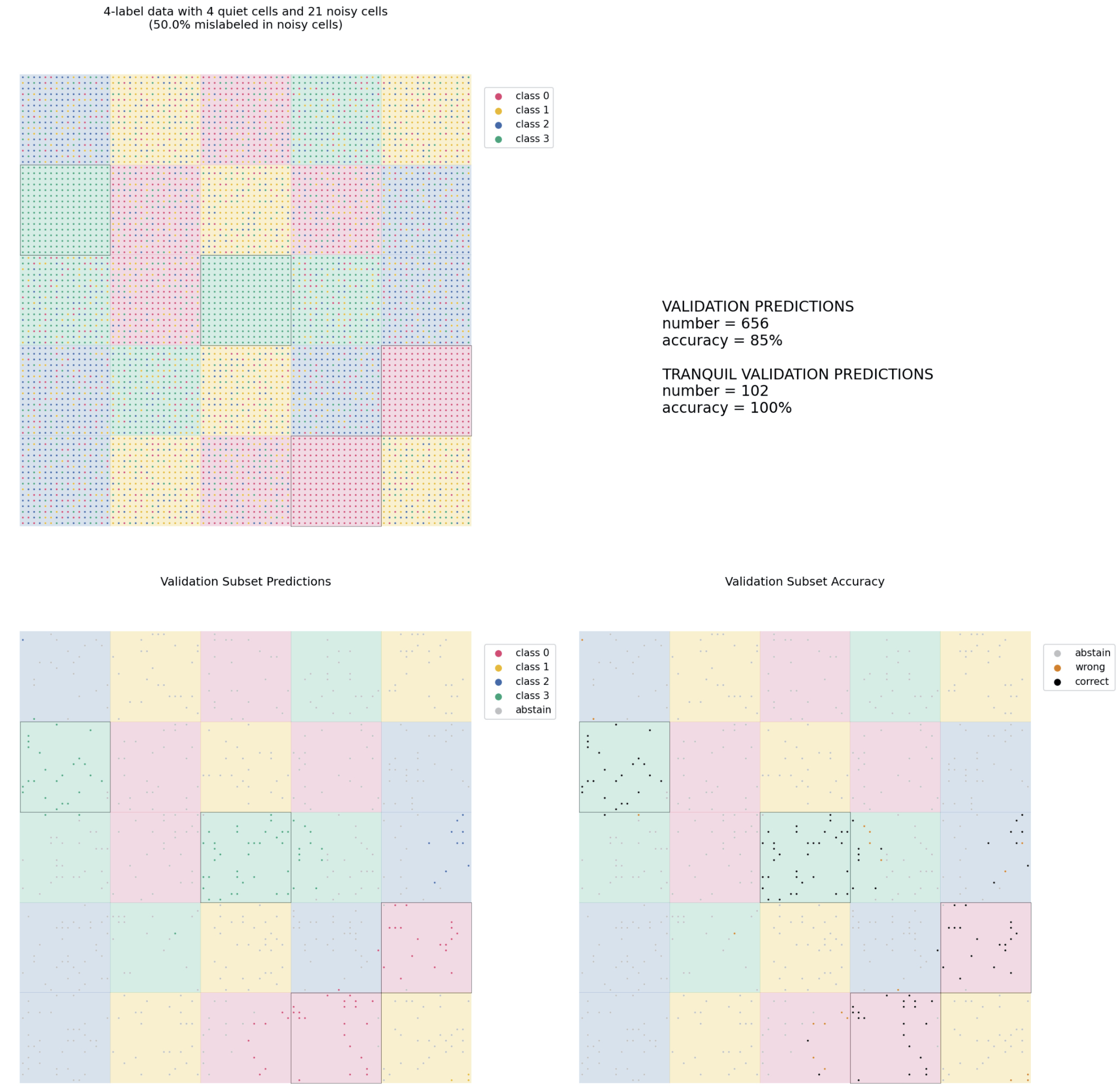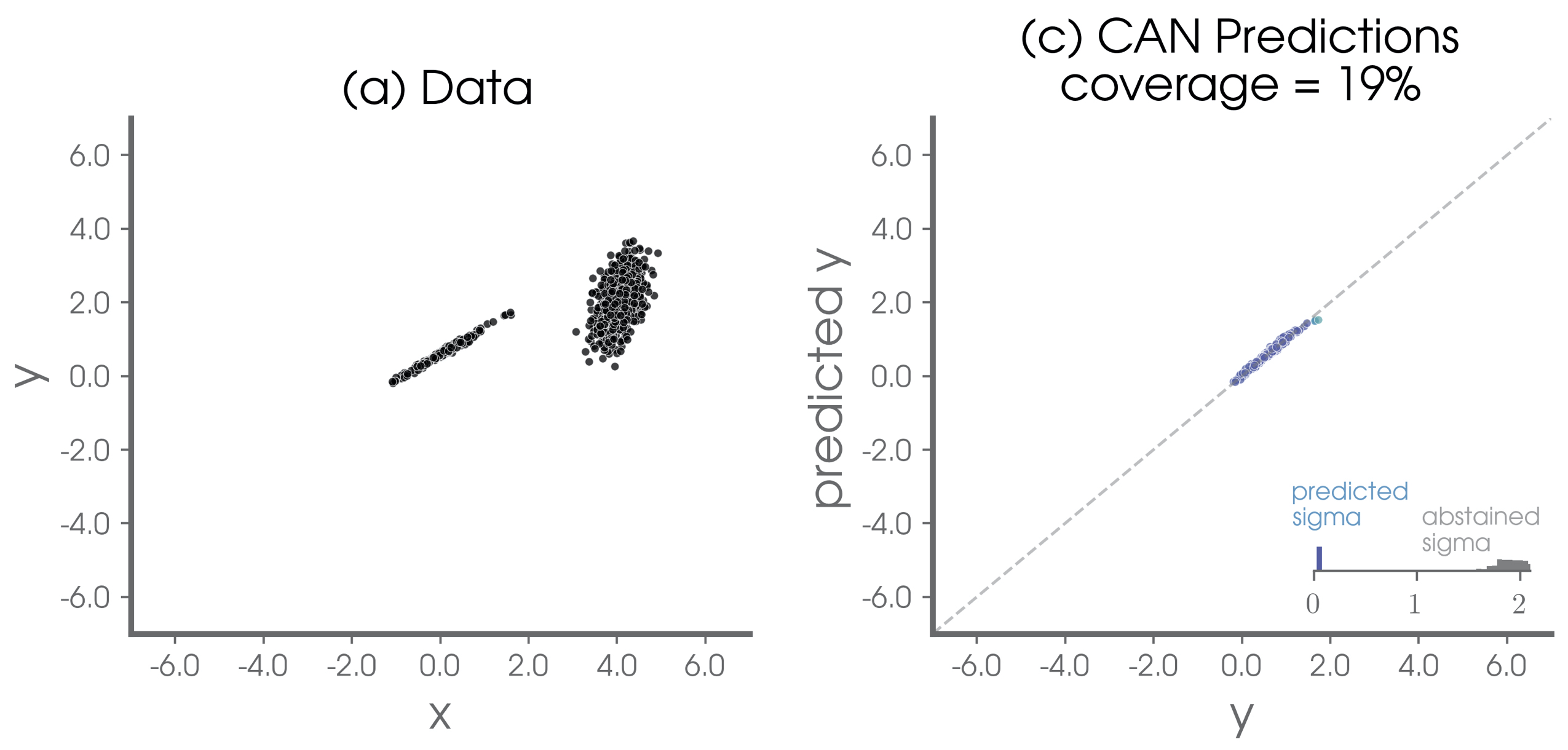Deep neural networks for classification and regression tasks are trained with novel abstention losses such that that they can say "IDK" (I Don't Know) when they are not confident. Unlike many methods for attaching uncertainty to neural network predictions post-training, the abstention loss is applied during training to identify, and preferentially learn from, the more confident samples - leading to more accurate predictions.
-
For classification tasks, we impose an additional abstention class into which the network can place a sample when it is unsure of the answer. We also introduce the NotWrong loss which performs particularly well with the CAN. Based on Thulasidasan (2020) but with substantial updates, this version uses a PID controller to fix the abstention rate to a user-defined value during training. Results are published in Barnes and Barnes (2021a).
-
For regression tasks, the abstention loss works by incorporating uncertainty in the network's prediction based on a standard computer science method. The abstention loss is designed to determine the optimal abstention fraction, or abstain on a user-defined fraction via a PID controller. Results are published in Barnes and Barnes (2021b).
This code was written in python 3.7.9 with tensorflow 2.4.
To implement the specific CAN code you will need the following:
metrics.pyabstentionalloss.pymodel.fit()will require the abstentionloss.AlphaUpdaterCallback()model.compile()will require custom metrics depending on the task, e.g.metrics.AbstentionFraction(abstain)alpha_value(y_true,y_pred)- where
def alpha_value(y_true,y_pred): return loss_function.updater.alpha
Example classification use of the CAN is provided in classification/main_gameboard.ipynb using a synthetic "gameboard" data set for illustrative purposes.
General options for different loss functions and PID controller methods are briefly described below.
loss function classes
---------------------
* DACLoss(tf.keras.losses.Loss):
Modified k-class cross-entropy per-sample loss with spinup, as defined by
Sunil Thulasidasan.
* NotWrongLoss(tf.keras.losses.Loss):
Abstention loss function that highlights being "not wrong", rather than
being right, while penalizing abstentions.
alpha updater classes
---------------------
* Colorado(AlphaUpdater):
Discrete-time PID updater using moving sums of batch counts.
* Minnesota(AlphaUpdater):
Discrete-time PID updater using non-overlapping sets of batch counts.
* Washington(AlphaUpdater):
A PID-like updater based on the code of Sunil Thulasidasan.
notes
-----
* All abstention loss functions have a penalty term to control the fraction of
abstentions. The penalty term takes the form:
penalty = -alpha * log(likelihood of not abstaining)
* The updater determines how alpha changes throughout the training. The changes
can be systematic, or using control theory to achieve a specified setpoint.
Example regression use of the CAN is provided in regression/main_1D.ipynb using a synthetic 1D data set for illustrative purposes.
General options for different loss functions and PID controller methods are briefly described below.
loss function classes
---------------------
* AbstentionLogLoss(tf.keras.losses.Loss):
Regression log-loss with an abstention option based on tau. This formulation
also uses a PID or constant alpha as indicated by the updater.
* RegressLogLoss(tf.keras.losses.Loss):
Baseline regression log-loss that includes uncertainty via a 2-output regression setup.
alpha updater classes
---------------------
* Colorado(AlphaUpdater):
Discrete-time PID updater using moving sums of batch counts.
* Constant(AlphaUpdater):
Keep alpha constant throughout training.
notes
-----
* The regression abstention loss function has a penalty term to control the fraction of
abstentions. The penalty term takes the form:
penalty = -alpha * log(prediction weight)
* The updater determines how alpha changes throughout the training. The changes
can be systematic, or using control theory to achieve a specified setpoint.
- python 3.7.9
- tensorflow 2.4
This work is a collaborative effort between Dr. Elizabeth A. Barnes and Dr. Randal J. Barnes. With that said, work by Thulasidasan et al. (2019) and Thulasidasan (2020) were fundamental starting points for this work.
This work was funded, in part, by the NSF AI Institute for Research on Trustworthy AI in Weather, Climate, and Coastal Oceanography (AI2ES).
- Barnes, Elizabeth A. and Randal J. Barnes (2021a): Controlled abstention neural networks for identifying skillful predictions for classification problems, submitted to JAMES, 04/2021, preprint available at https://arxiv.org/abs/2104.08281.
- Barnes, Elizabeth A. and Randal J. Barnes (2021b): Controlled abstention neural networks for identifying skillful predictions for regression problems, submitted to JAMES, 04/2021, preprint available at https://arxiv.org/abs/2104.08236.
- Thulasidasan, S., T. Bhattacharya, J. Bilmes, G. Chennupati, and J. Mohd-Yusof, 2019: Combating Label Noise in Deep Learning Using Abstention. https://arxiv.org/abs/1905.10964.
- Thulasidasan, S., 2020: Deep Learning with abstention: Algorithms for robust training and predictive uncertainty. https://digital.lib.washington.edu/researchworks/handle/1773/45781.
This project is licensed under an MIT license.
MIT © Elizabeth A. Barnes

